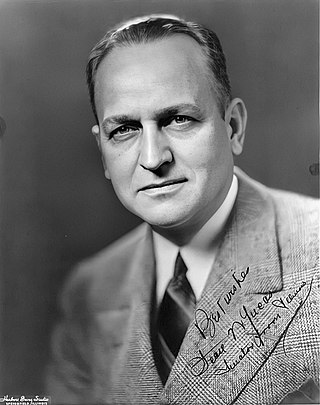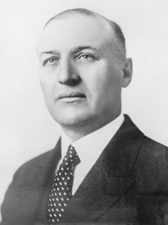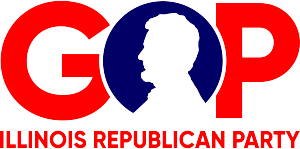
Scott Wike Lucas was an American attorney and politician. A member of the Democratic Party, he represented Illinois in the U.S. House of Representatives (1935–1939) and the U.S. Senate (1939–1951). He was the Senate Majority Leader from 1949 to 1951.

The 1970 United States Senate elections was an election for the United States Senate. It took place on November 3, with the 33 seats of Class 1 contested in regular elections. Special elections were also held to fill vacancies. These races occurred in the middle of Richard Nixon's first term as president. The Democrats lost a net of three seats, while the Republicans and the Conservative Party of New York picked up one net seat each, and former Democrat Harry F. Byrd Jr. was re-elected as an independent.

The 1964 United States Senate elections were held on November 3. The 33 seats of Class 1 were contested in regular elections. Special elections were also held to fill vacancies. They coincided with the election of President Lyndon B. Johnson by an overwhelming majority, to a full term. His Democratic Party picked up a net two seats from the Republicans. As of 2023, this was the last time either party has had a two-thirds majority in the Senate, which allowed the Senate Democrats to override a veto, propose constitutional amendments, or convict and expel certain officials without any votes from Senate Republicans. However, internal divisions would have prevented the Democrats from having done so. The Senate election cycle coincided with Democratic gains in the House in the same year.

The 1938 United States Senate elections occurred in the middle of Franklin D. Roosevelt's second term. The 32 seats of Class 3 were contested in regular elections, and special elections were held to fill vacancies. The Republicans gained eight seats from the Democrats, though this occurred after multiple Democratic gains since the 1932 election, leading to the Democrats retaining a commanding lead over the Republicans with more than two-thirds of the legislative chamber.

The 1930 United States Senate elections occurred in the middle of Republican President Herbert Hoover's term. The 32 seats of Class 2 were contested in regular elections, and special elections were held to fill vacancies. With the Great Depression beginning to take hold, Republican incumbents became unpopular, and Democrats picked up a net of eight seats, erasing the Republican gains from the previous election cycle, however, Republicans retained control of the chamber. This was the first of four consecutive Senate elections during the Depression in which Democrats made enormous gains, achieving a cumulative pick-up of 34 seats.

Otis Ferguson Glenn was a Republican United States Senator from the State of Illinois.

William Henry Dieterich was an American lawyer and Democratic politician from Illinois. He was a state legislator, U.S. Representative, and U.S. Senator

The 1912–13 United States Senate elections were held on various dates in various states. They were the last U.S. Senate elections before the ratification of the Seventeenth Amendment in 1913, establishing direct elections for all Senate seats. Senators had been primarily chosen by state legislatures. Senators were elected over a wide range of time throughout 1912 and 1913, and a seat may have been filled months late or remained vacant due to legislative deadlock. Some states elected their senators directly even before passage of Seventeenth Amendment. Oregon pioneered direct election and experimented with different measures over several years until it succeeded in 1907. Soon after, Nebraska followed suit and laid the foundation for other states to adopt measures reflecting the people's will. By 1912, as many as 29 states elected senators either as nominees of their party's primary or in conjunction with a general election.

The Illinois Republican Party is the affiliate of the Republican Party in the U.S. state of Illinois founded on May 29, 1856. It is run by the Illinois Republican State Central Committee, which consists of 18 members, one representing each of the state's congressional districts. Once the dominant party in Illinois, the state GOP has become a minority party within the last few decades, holding little power in the state. The current chairman is Don Tracy, who has served since 2021.

The 1932 United States Senate election in Iowa took place on November 8, 1932. Incumbent Republican Senator Smith Brookhart, a controversial progressive figure within the conservative Iowa Republican Party, was defeated in the June Republican primary by Henry A. Field. Field was in turn defeated in the general election by Democrat Louis Murphy. Brookhart also entered the general election as the candidate of the Progressive Party but finished a distant third.

The 1938 United States Senate election in Illinois took place on November 8, 1938. Incumbent first-term Democrat William H. Dieterich retired. Fellow Democrat Scott W. Lucas was elected to succeed him.

Two United States Senate elections were held in Illinois on March 26, 1913. The two elections were interconnected through a compromise made to elect a Democrat in the regular election and a Republican in the special election.

The 1930 United States Senate election in Illinois took place on November 4, 1930.

The 1928 United States Senate special election in Illinois took place on November 6, 1928. The election was held due to the U.S. Senate's refusal to seat 1926 election winner, Republican Frank L. Smith, due to allegations of election fraud. The election saw the election of Republican Otis F. Glenn.

The 1936 United States Senate election in Illinois took place on November 3, 1936. Incumbent Democrat J. Hamilton Lewis was elected to a second consecutive, and third overall, term as United States senator.

Elections were held in Illinois on Tuesday, November 5, 1940.

Elections were held in Illinois on Tuesday, November 8, 1938.

Isaac Newton Jenkins was an American attorney, soldier, and political candidate. A perennial candidate for political office, Jenkins ran for office in Illinois many times. He originally ran as a Robert La Follette-aligned progressive member of the Republican Party in the 1920s. Beginning in the mid-1930s, Jenkins publicly espoused antisemitic and fascist views and aligned himself with Adolf Hitler and other Nazis. He associated with other American pro-fascists. He was a figure in the short-lived Union Party, and served as the director of William Lemke's 1936 campaign as the party's presidential nominee.

Elections were held in Illinois on Tuesday, November 3, 1936.

The 1932 Illinois gubernatorial election was held on November 8, 1932. It saw the election of Democrat Thomas Donavan, who defeated incumbent Republican liuetenant governor Fred E. Sterling.



















